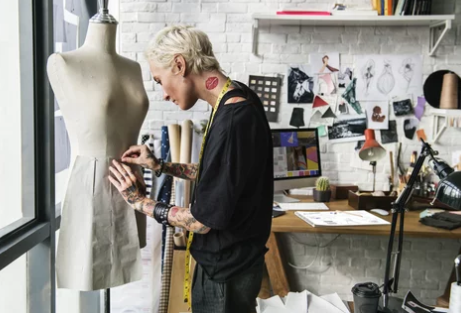

Fashion is unlikely to look the same again, thanks to a global epidemic and significant BLM protests. But one thing hasn’t changed in the least: fashion is just a giant deception. As luxury companies and stores prepare their next moves, the pandemic’s vanity and self-importance are among the most significant results. Is it possible, though, for business to resume as usual? JD Institute Of Fashion technology, which offers various industry-based courses and record-breaking placements, is here with a deep analysis of how much the fashion industry will change?
Though the optics of change have long been more tempting to the business than practical change, the industry responded forcefully amid the public health emergency with vows to learn, reform, and grow. The fashion industry’s biggest problem in the next few years will be whether it can actually nurture systemic change, especially in the face of a generation of socially conscious buyers.
Slowly but steadily, the industry is reopening as if the epidemic had never happened as if the open letters and pledges of reform were old news. While menswear and couture shows have mainly shifted online, real fashion weeks are being announced across the ;’;world in compliance with local health regulations. Dolce & Gabbana, Dior, Burberry and Balmain will all have their own fashion shows.
Meanwhile, businesses are opening their doors and continue to drop clothes prices as extra inventory accumulates. It’s too late for many. Some department shops and merchants have already declared bankruptcy, while many more have grim prospects, teetering between keeping afloat and falling – regardless of their expertise or foresight. Will the surplus of unsold goods serve as a wake-up call for one of the most destructive sectors on the planet? Has the epidemic affected the expectations of consumers?
While fashion is figuring out how to go on, the virus continues to spread over the world, with the World Health Organization predicting that the worst is yet to come. Here’s what industry experts in fashion design, purchasing and merchandising, media, public relations and communications, consultancy, and chief executives had to say about the future of fashion and how much will truly change.
For a long time, fashion has prioritised the optics of change above adopting policy when it comes to change. In recent years, discussions about racism, feminism, and sustainability have dominated the fashion agenda, despite the fact that genuine progress is moving at a snail’s pace. Performative activism ran rampant on Instagram feeds and Twitter streams during the marches for racial justice that brought thousands of activists from across the world. This shallow and meaningless performance drew ire from critics.
“Right after the horrific murder of George Floyd and Breonna Taylor, we witnessed a number of firms and influencers from different sectors sending messages of support while doing little to change their businesses. They claim to support the Black Lives Matter movement yet lack diversity in their boardrooms and in the material they produce. I hope that as an industry, we continue to assess what business as usual entails and begin to consider how we might diversify internally, particularly in terms of how we treat the people we deal with. I am enthusiastic about the future of the sector. “However, I don’t believe it will happen overnight.”
“When it comes to any business, communication is the most important factor. Because today’s young customers are accustomed to conversing about anything, even sometimes taboo subjects, they will expect the same from companies. To conduct those types of interactions, a brand or platform must become comfortable.”
Fashion week isn’t going anywhere. Despite the fact that COVID-19 restricted international travel and physical gatherings, fashion councils and federations all around the world rallied. It started with Shanghai and Moscow and has since expanded to include digital versions of London, Milan Fashion Week and Paris
“There was a desire for a tangible fashion week – not from all businesses, but from some. We chose to focus on a different project in July. We’ll see how things turn out. A visceral or emotional experience, on the other hand, is not the same as a digital one. Because the physical expression is so crucial, digital cannot replace it. We’re doing exactly the same thing in September as we were in February and March. We’re still following the government’s health recommendations. We’re hoping that a digital fashion week will give us a better understanding of how physical and digital can work together.”
Large department shops and smaller, independent shops with regulated traffic are charged with navigating the new global order when luxury shopping locations reopen following a mandatory lockdown. Even after lockdown restrictions were eased, many companies’ doors remained shut. Jeffrey, a Nordstrom-owned store in the United States, has closed its doors. Others are fighting uphill fights to restore momentum – in the United States, Neiman Marcus filed for Chapter 11 bankruptcy. Meanwhile, retailers are prepared for lower footfall and sales with a looming global recession and worries of a second wave of infection.
“It goes without saying that premium brands must defend their brand equity. Why shouldn’t independent designers do the same? Why should certain brands have discounts in November and May but not others? Is there a future for the retail-wholesale-independent-designer connection, or will the next financial crisis wipe out this generation of independents, forcing them to go direct-to-consumer? It’s a significant risk for me since I think of merchants as curators. The regulations must be rewritten. We’re playing by fifty-year-old rules that only apply to two or three companies and quick fashion.”
If fashion designing is something you see as a career, education is the first step towards it. JD Institute Of Fashion Technology is one of the best institutes when art or creativity is focused upon reflecting a legacy of over 32 years and industry-based courses such as diploma in fashion designing or diploma in fashion. Enroll now!